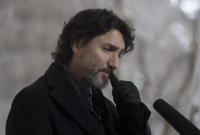Support strong Canadian climate journalism for 2025
The federal government says it ran a budgetary deficit of $268.2 billion through 10 months of its fiscal year as the treasury pumped out more pandemic aid.
The deficit from April to January compares to a deficit of $10.6 billion over the same period one year earlier.
The government says in its monthly fiscal monitor that the deep deficit reflects the unprecedented deterioration in the economy and the government's spending response to the COVID-19 pandemic.
Program spending, excluding net actuarial losses, ran up to nearly $474 billion between April and January, a $216.3-billion increase from the $257.7 billion one year earlier.
The federal wage subsidy, benefits for hard-hit workers, and elevated transfers to provinces all contributed to the rise.
At the same time, revenues were $235.8 billion, a $40.5-billion drop from the same period one year earlier, as tax revenues and EI premiums decreased, and Crown corporations reported lower profits.
Public debt charges fell to $17.2 billion compared with $20.2 billion a year earlier, largely reflecting lower inflation and interest rates.
At the end of January, net federal debt was just under $1.09 trillion.
The fiscal monitor released Friday will be the last budgetary update before the government tables a budget on April 19, its first since March 2019.
The budget is expected to provide an accounting of government spending through the pandemic, which the Finance Department in November estimated will send the deficit for the fiscal year to almost $400 billion.
The Liberals have also promised a plan to spend between $70 billion and $100 billion over the coming years in fiscal stimulus to help the economy recover.
The Liberals will need the support in the House of Commons of at least one other major party to pass their upcoming spending plan.
In a letter this week, Conservative Leader Erin O'Toole told Prime Minister Justin Trudeau that he expected the budget to include no new tax increases and to ease regulations to prod business investment in machinery, technology and equipment.
The concern is that absent that spending, Canadian companies won't be able to compete as global economies rebound, slowing growth in wages and job creation the government wants to see.
The letter went on to suggest the government avoid what O'Toole called "large, costly, and universal social programs" that could hurt economic growth, warning Trudeau that his party would resist "partisan pet projects and new unsustainable permanent spending."
This report by The Canadian Press was first published March 26, 2021.





Comments
The Most Powerful Woman On Earth?
https://www.investing.com/analysis/the-most-powerful-woman-on-earth-200…
"This is where Ms. Kelton and the MMT school of economic thought have really won the debate on economics. By destroying the incorrect economic model of “sound money and sound budget management” – which again seems utterly intuitive on the individual level, but is false at the sovereign level- they have opened up the possibility for greater stimulus on the part of the fiscal authorities.
***
As Kelton succinctly puts it, “MMT replaces the fake constraint of deficit with the real constraint of inflation.”
______________________________________
Modern Monetary Theory in Canada